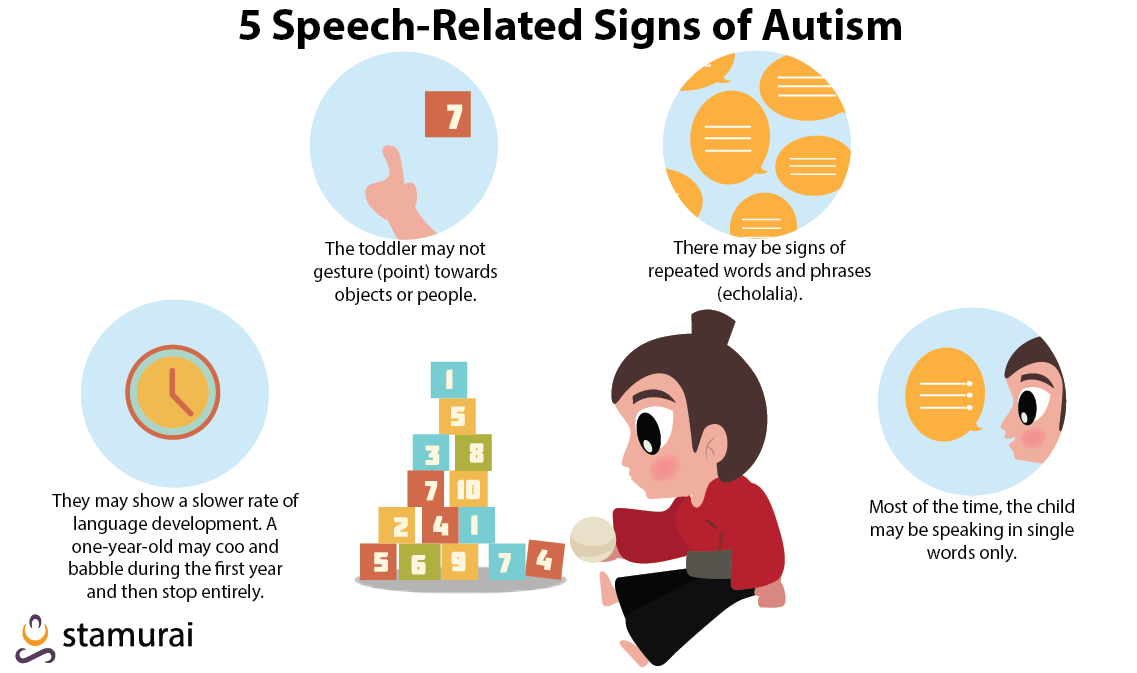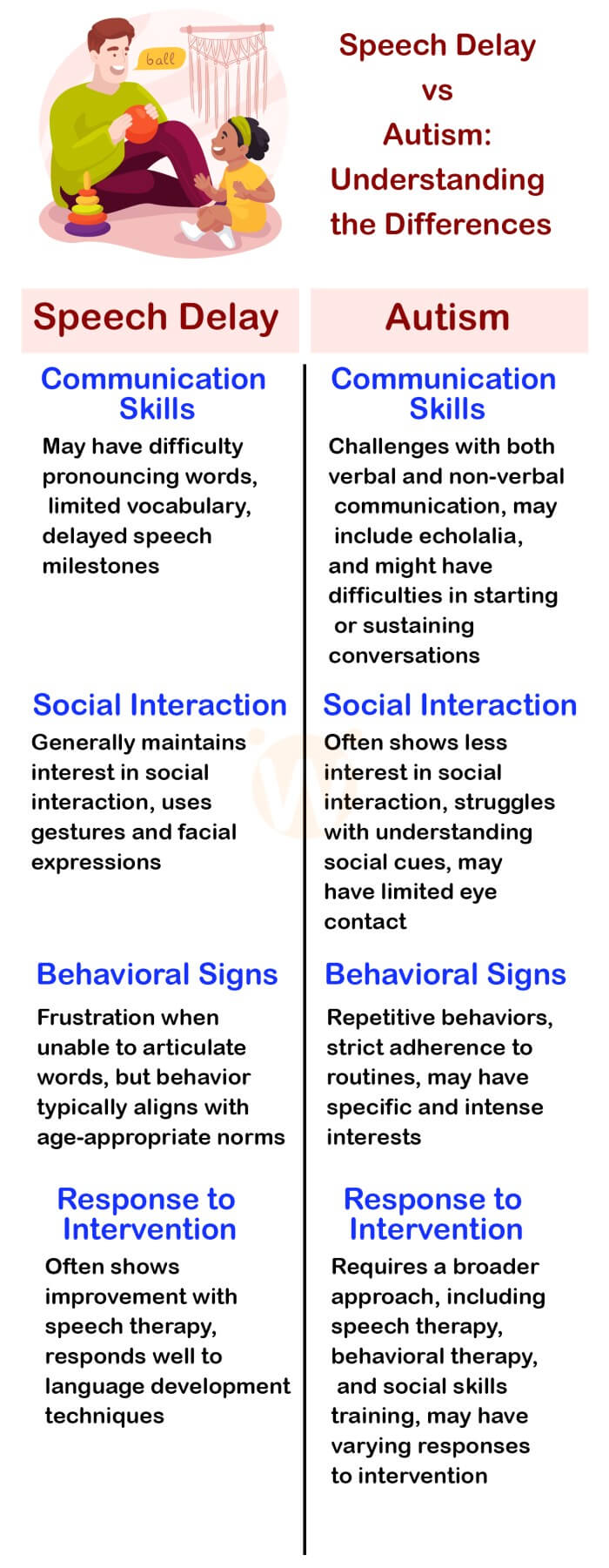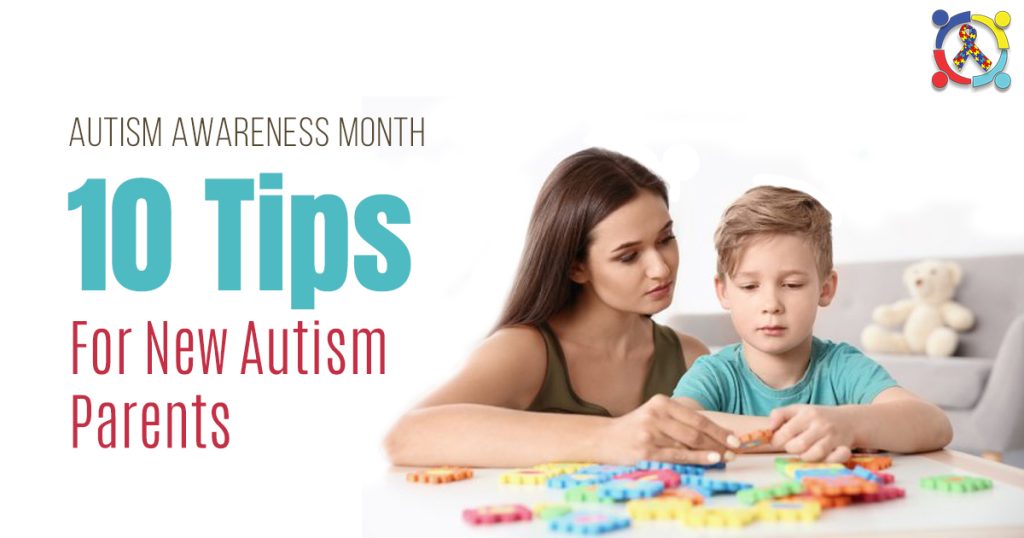Are you a parent or caregiver concerned about your child’s speech development? If so, you’re not alone.
Many parents notice their children taking a bit longer to start speaking and naturally wonder if it could be something more, like autism. The line between a simple speech delay and autism can often seem blurred and confusing. You might find yourself searching for clues or worrying about missing early signs.
Don’t worry; you’re in the right place. This article will help you understand the differences and similarities between speech delays and autism, so you can feel more confident in taking the next steps for your child’s development. Let’s unravel this mystery together, providing you with clarity and peace of mind.
Speech Delay Vs. Autism
Speech delay and autism can appear similar, making diagnosis challenging. Both may show limited verbal skills and social interaction difficulties. Understanding the differences helps in providing appropriate support and intervention.
Understanding the difference between speech delay and autism is crucial. Many parents worry about their child’s development. Speech delay and autism can have overlapping signs. This makes it hard to tell them apart. Knowing the differences helps in getting the right support.Defining Speech Delay
Speech delay means a child speaks later than others. This can be due to various reasons. It might be because of hearing issues or lack of stimulation. Some children are late bloomers and catch up later. Others might need help from speech therapists. Speech delay is about language skills only.Characteristics Of Autism
Autism affects communication and behavior. Children with autism may have trouble with social interactions. They might not make eye contact or respond to their name. Repetitive behaviors are common. Some may have unusual interests or routines. Autism involves a range of symptoms, not just speech.Common Symptoms
Distinguishing between speech delay and autism can be challenging. Both conditions share similar symptoms. Understanding these symptoms is crucial. It helps in identifying the right condition. This section explores common symptoms of both. It provides insights into communication and social challenges.
Communication Challenges
Children with speech delay often struggle with expressing themselves. They find it hard to form words or sentences. This can lead to frustration. In contrast, children with autism might not respond to their name. They may also exhibit unusual speech patterns. Both conditions can affect communication. Understanding these differences is key.
Social Interaction Differences
Social skills vary between speech delay and autism. Children with speech delay may play well with others. They understand social cues but struggle with words. In autism, social interactions are often more challenging. Children may avoid eye contact. They might not engage in pretend play. These differences highlight the unique aspects of each condition.
Misconceptions And Myths
Speech delays and autism often appear similar, causing confusion. These two are distinct, with different causes and treatments. Parents may misinterpret speech delays as autism, leading to unnecessary worry. Understanding the differences helps in addressing concerns accurately and seeking appropriate guidance.
Misconceptions often arise when discussing speech delays and autism. Many people mistakenly believe they are the same. This confusion can lead to unnecessary stress. Parents may worry about autism when it’s just a speech delay. Understanding the differences helps clear up these myths. ###Similarities Misleading Diagnosis
Both conditions can show similar symptoms. Children with speech delays may have trouble expressing themselves. This can be mistaken for autism, which also affects communication. However, autism involves more complex social interactions. Speech delay mainly impacts language skills. This overlap can sometimes mislead diagnosis. ###Cultural Perceptions
Different cultures have varying views on speech development. Some cultures emphasize early speech milestones. Others may not focus as much on early language skills. This can affect how parents perceive speech delays. Cultural perceptions can contribute to myths about autism. Recognizing these differences is important. It helps in understanding the child’s development accurately.Diagnostic Approaches
Speech delay can sometimes resemble autism due to overlapping symptoms. Understanding diagnostic approaches is essential for accurate identification. Professionals assess communication, social skills, and behavior to distinguish between speech delay and autism.
Understanding the differences between a speech delay and autism can be challenging. Both conditions may appear similar at first glance, but they require distinct diagnostic approaches. How do professionals determine the right path? Let’s explore some key methods. ###Speech-language Assessment
A speech-language assessment is often the first step when a child shows signs of communication difficulties. Speech therapists evaluate various aspects of a child’s speech, like pronunciation, vocabulary, and sentence structure. They also assess how well a child understands language. For instance, a speech delay might involve difficulties in producing certain sounds or forming words, whereas comprehension is typically intact. You might find it helpful to observe how your child interacts with others. Do they understand instructions, even if they can’t verbally respond? This insight is crucial for speech therapists. ###Autism Spectrum Evaluations
Autism spectrum evaluations are more comprehensive. They go beyond speech and language to examine social, behavioral, and developmental factors. Specialists may use tools like the Autism Diagnostic Observation Schedule (ADOS) and other standardized tests. Parents often notice subtle signs, like a lack of eye contact or repetitive behaviors. Have you observed these in your child? These evaluations consider these behaviors to form a holistic view. Importantly, they involve input from multiple professionals, including psychologists and pediatricians. Diagnosing autism is complex and requires a multi-disciplinary approach. Each professional brings a piece of the puzzle to form an accurate diagnosis. This process ensures that your child receives the tailored support they need. In navigating these diagnostic paths, staying informed and involved is key. Your observations and insights are invaluable to professionals. Have you shared your child’s developmental milestones with their healthcare provider? Doing so can make a significant difference in the diagnostic process.Effective Interventions
Speech delay can sometimes mimic autism, causing confusion. Both conditions may show communication challenges and social interaction difficulties. Effective interventions help differentiate and address these issues, providing tailored support.
### Effective Interventions Navigating the world of speech delays and autism can be challenging for any parent. But understanding effective interventions can make a world of difference. Let’s dive into some practical strategies that can help your child thrive. ###Speech Therapy Techniques
Speech therapy is a cornerstone for addressing both speech delays and autism. One effective technique is the use of visual aids, like picture cards. These can help your child associate words with images, making it easier to communicate. Another technique is modeling. Speak slowly and clearly, using simple sentences. Encourage your child to repeat after you. This can improve their pronunciation and boost their confidence in speaking. Interactive games can also be a powerful tool. Games that require verbal responses can motivate your child to practice speaking in a fun way. Have you tried setting aside a few minutes each day for these activities? ###Behavioral Therapies
Behavioral therapies, such as Applied Behavior Analysis (ABA), can be highly effective. ABA focuses on reinforcing positive behaviors through structured activities. This can help your child develop better communication and social skills. Consider introducing routines. Consistent routines can provide a sense of security, which is crucial for children with autism. Knowing what to expect can reduce anxiety and encourage verbal interaction. Parent involvement is key. Spend time observing your child’s reactions and adapt your approach based on what works best for them. Have you noticed certain triggers or motivators? Use this information to tailor the therapy to your child’s unique needs. Engaging in these interventions can feel overwhelming, but remember, small steps can lead to significant progress. What strategies have you found most effective in your journey?
Credit: www.stamurai.com
Parental Guidance
Parents often feel anxious about their child’s speech development. It’s crucial to understand the difference between a speech delay and autism. Both conditions can share similar traits. Yet, they require different approaches. Recognizing signs early helps parents provide the right support.
Recognizing Signs
Pay close attention to how your child communicates. Speech delay might mean fewer words or unclear speech. Autism might include lack of eye contact or repetitive behaviors. Not all children show the same symptoms. Compare your child’s behavior with typical developmental milestones.
Seeking Professional Help
Consulting a professional can offer guidance. Speech therapists or pediatricians can assess your child’s needs. They provide personalized strategies. Early intervention often leads to better outcomes. Don’t hesitate to seek help if you’re concerned.
Future Research Directions
Exploring the overlap between speech delay and autism can reveal new research paths. Understanding these conditions requires careful investigation to differentiate symptoms. Future studies could focus on identifying key markers that distinguish speech delay from autism, aiding in accurate diagnosis and tailored interventions.
Understanding whether a speech delay can resemble autism is a critical question for parents and professionals alike. As we look to the future, research is paving the way for better insights and solutions. Discovering new methods to differentiate between speech delays and autism is key. This exploration not only helps in providing accurate diagnoses but also in tailoring effective interventions for those in need.Advancements In Diagnostic Tools
The future holds promise with new diagnostic tools on the horizon. Imagine a world where a simple, non-invasive test can swiftly identify the nuances between speech delays and autism. Tools using artificial intelligence and machine learning are being developed to analyze speech patterns and social interactions in children. These advancements could drastically reduce misdiagnosis rates. You might soon be able to access these tools through your local pediatrician. The accuracy of these tools will empower you to make informed decisions about your child’s developmental needs.Longitudinal Studies
Longitudinal studies are crucial in understanding the developmental trajectory of children with speech delays and autism. These studies track children over several years to observe the evolution of their communication skills and social behavior. By participating in these studies, families can contribute to research that could unlock early intervention strategies. Wouldn’t it be reassuring to know that your child’s progress is contributing to a broader understanding that could help thousands of others? These studies also provide insights into which interventions work best over time. The knowledge gained can guide you in choosing the right path for your child, ensuring they receive the support they need at every stage of development. As research continues, the lines between speech delays and autism will become clearer. This clarity will not only alleviate parental concerns but also enhance the quality of life for countless children. Your engagement and curiosity in these areas are vital to fueling the momentum of this crucial research.
Credit: speechandtalk.com

Credit: www.mywellnesshub.in
Frequently Asked Questions
How Can You Tell The Difference Between Autism And Speech Delay?
Autism affects social skills, communication, and behavior, while speech delay mainly impacts language development. Autism may include repetitive behaviors and difficulty with social interaction. A professional evaluation is essential to accurately differentiate between the two conditions. Early diagnosis and intervention can improve outcomes for both autism and speech delay.
Can A Child Have Delayed Speech And Not Be Autistic?
Yes, a child can have delayed speech without being autistic. Various factors like hearing issues, language exposure, or developmental delays can affect speech. Consulting a pediatrician or speech therapist can help determine the cause and guide suitable interventions. Early evaluation and support are key for addressing speech delays.
What Are The Three Main Symptoms Of Autism?
The three main symptoms of autism are difficulties in social interaction, challenges in communication, and repetitive behaviors. Individuals may struggle to understand social cues, express themselves, or adapt to changes. Early detection and intervention can improve outcomes.
What Is The Speech Pattern Of Autism?
Autism speech patterns can include delayed speech, repetitive phrases, and difficulty with social communication. Some individuals may exhibit echolalia, mimicking words or phrases. Others might struggle with tone, volume, or context. Each person with autism may have unique speech characteristics, impacting their ability to communicate effectively.
Conclusion
Understanding speech delays and autism can be challenging. Both conditions share similar signs. Yet, they are distinct. A professional diagnosis is crucial. Early intervention often helps children thrive. Parents should observe their child’s development closely. Regular check-ups can ease worries.
Open communication with healthcare providers is key. Trust your instincts. Seek advice when needed. Every child is unique. Celebrate their progress, no matter how small. With support, children can overcome many challenges. Patience and understanding make a big difference. Remember, you’re not alone in this journey.
Many resources are available to guide you. Stay informed and proactive.

